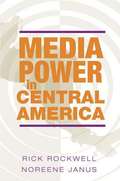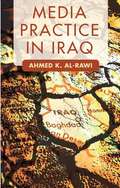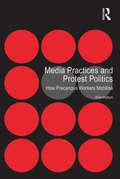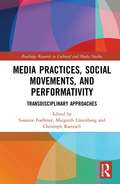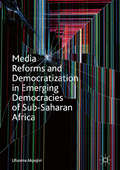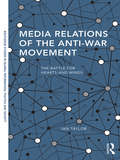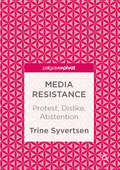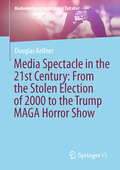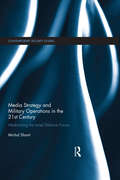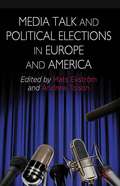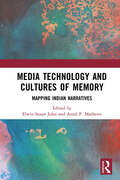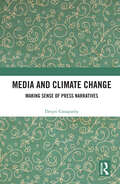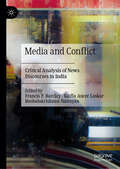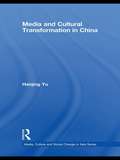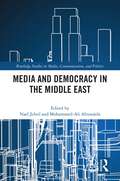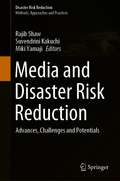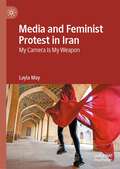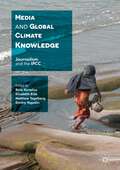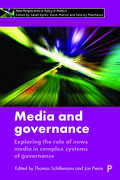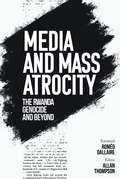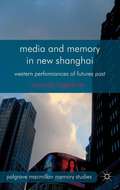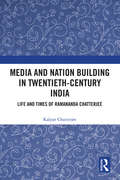- Table View
- List View
Media Power in Central America
by Rick Rockwell Noreene JanusMedia Power in Central America is the first book in a generation to explore the media landscape in Central America. It captures the political and cultural interplay between the media and those in power in Costa Rica, El Salvador, Guatemala, Honduras, Panama, and Nicaragua. Highlighting the subtle strangulation of opposition media voices in the region, the authors show how the years since the guerrilla wars have not yielded the free media systems that some had expected. Country by country, the authors deal with the specific conditions of government-sponsored media repression, economic censorship, corruption, and consumer trends that shape the political landscape. Challenging the notion of the media as a democratizing force, Media Power in Central America shows how the media are used to block democratic reforms in the region and outlines the difficulties of playing watchdog to rulers who use the media as a tool of power.
Media Practice in Iraq
by Ahmed K. Al-RawiA historical survey of the Iraqi media from its beginning up to the present day, focusing on the post-2003 media scene and the political and societal divisions that occurred in Iraq after US-led occupation. Investigates the nature of the media outlets and offers an analysis of the way Iraqi satellite channels covered the 2010 general elections.
Media Practices and Protest Politics: How Precarious Workers Mobilise
by Alice MattoniHow do precarious workers employed in call-centres, universities, the fashion industry and many other labour markets organise, struggle and communicate to become recognised, influential political subjects? "Media Practices and Protest Politics; How Precarious Workers Mobilise" reveals the process by which individuals at the margins of the labour market and excluded from the welfare state communicate and struggle outside the realm of institutional politics to gain recognition in the political sphere. In this important and thought provoking work Alice Mattoni suggests an all-encompassing approach to understanding grassroots political communication in contemporary societies. Using original examples from precarious workers mobilizations in Italy she explores a range of activist media practices and compares different categories of media technologies, organizations and outlets from the printed press to web application and from mainstream to alternative media. Explaining how activists perceive and understand the media environment in which they are embedded the book discusses how they must interact with a diverse range of media professionals and technologies and considers how mainstream, radical left-wing and alternative media represent protests. Media Practices and Protest Politics offers important insights for understanding mechanisms and patterns of visibility in struggles for recognition and redistribution in post-democratic societies and provides a valuable contribution to the field of political communication and social movement studies.
Media Practices, Social Movements, and Performativity: Transdisciplinary Approaches (Routledge Research in Cultural and Media Studies)
by Margreth Lünenborg Susanne Foellmer Christoph RaetzschAs individuals incorporate new forms of media into their daily routines, these media transform individuals’ engagement with networks of heterogeneous actors. Using the concept of media practices, this volume looks at processes of social and political transformation in diverse regions of the world to argue that media change and social change converge on a redefinition of the relations of individuals to larger collective bodies. To this end, contributors examine new collective actors emerging in the public arena through digital media or established actors adjusting to a diversified communication environment. The book offers an important contribution to a vibrant, transdisciplinary, and international field of research emerging at the intersections of communication, performance and social movement studies.
Media Reforms and Democratization in Emerging Democracies of Sub-Saharan Africa
by Ufuoma AkpojiviThis book examines the media reform processes and re-democratization projects of Ghana and Nigeria’s emerging democracies. It evaluates and critiques these reform processes, arguing that because of dependency approaches resulting from the transplanting of policy framework from the West into these emerging democracies, the policy goals and objectives of the reforms have not been achieved. Consequently, the inherent socio-cultural, economic and political factors, coupled with the historical antecedents of these countries, have also affected the reform process. Drawing from policy documents, analyses and interviews, Ufuoma Akpojivi argues that the lack of citizens’ active participation in policy processes has led to neo-liberalization and the continued universalization of Western ideologies such as democracy, media freedom and independence. Akpojivi posits that the recognition of socio-cultural, political and economic factors inherent to these emerging democracies, coupled with the communal participation of citizens, will facilitate true media reform processes and development of these countries.
Media Relations of the Anti-War Movement: The Battle for Hearts and Minds (Routledge Studies in Global Information, Politics and Society)
by Ian TaylorIn this book, Ian Taylor examines how a social movement, the anti-Iraq War movement in the UK, engaged with the media as a part of their campaigning against the invasion and occupation of Iraq. Moving beyond content analysis to draw upon interviews with locally based journalists and activists, Taylor examines how locally based anti-war groups engaged with their local press, as well as how those groups were reported on by the local press in their respective areas. In the process of exploring these ideas, the book takes on questions like: How did local journalists assess the legitimacy of the anti-war movement? How, why, and to what extent did opponents of the war pursue local press coverage? What bearing did the social composition of the movement have on the way they set about engaging with the media? How did the local press handle the controversy surrounding opposition to military action against Iraq? Media Relations of the Anti-War Movement makes a unique contribution to research on the interactions between social movements and the media and plugs a major gap in the literature on the Iraq War and the media.
Media Representations of Anti-Austerity Protests in the EU: Grievances, Identities and Agency (Routledge Research in Cultural and Media Studies)
by Suman Gupta Tao PapaioannouThis book analyzes constructions of injustice, group identification and participation in news and social media in anti-austerity protests within the European Union (EU). Since 2008, EU member-states have witnessed waves of protests and demonstrations against the adoption of austerity measures and alignment of domestic economies with the prevailing global neoliberal order. Understanding how the media represents dissent and how it influences public deliberation is of critical importance. It is accordingly necessary to explore the strategies deployed and role played by news and social media in representing and perhaps acting upon anti-austerity protests in the Eurozone crisis. This volume undertakes such a critical exploration.
Media Resistance
by Trine SyvertsenThis book is open access under a CC BY license. New media divide opinion; many are fascinated while others are disgusted. This book is about those who dislike, protest, and try to abstain from media, both new and old. It explains why media resistance persists and answers two questions: What is at stake for resisters and how does media resistance inspire organized action? Despite the interest in media scepticism and dislike, there seems to be no book on the market discussing media resistance as a phenomenon in its own right. This book explores resistance across media, historical periods and national borders, from early mass media to current digital media. Drawing on cases and examples from the US, Britain, Scandinavia and other countries, media resistance is discussed as a diverse phenomenon encompassing political, professional, networked and individual arguments and actions. di
Media Spectacle in the 21st Century: From the Stolen Election of 2000 to the Trump MAGA Horror Show (Medienkulturen im digitalen Zeitalter)
by Douglas KellnerThis book offers an original analysis of the primacy of media spectacle in the politics, social history, and major events of the 21st century which highlights the importance of critical analysis and interpretation of broadcasting, the Internet, and social meaning in understanding the key historical events and the multiple factors that produce them during the contemporary era. The text explores how broadcasting and digital media constitute the major media spectacles of our time and how they in turn present the key issues, challenges, conflicts, and problems of the present era. Thus understanding broadcasting and digital media help us to understand our contemporary society, politics, and culture and to play a more active role in understanding and participating in our contemporary media societies and environments. Kellner argues throughout for the need for critical media and digital literacies to empower students and citizens to become active participants in our media society and technoculture and to understand the key events and challenges of contemporary life. Douglas Kellner has been researching, writing about, and lecturing upon the major topics and studies in this book for the last several decades and this book brings together key aspects of his work on theorizing, analyzing, and evaluating the role of effects of major media spectacles of the 21st century.
Media Strategy and Military Operations in the 21st Century: Mediatizing the Israel Defence Forces (Contemporary Security Studies)
by Michal ShavitThis book applies the concept of mediatization to the contemporary dynamic between war, media and society, with a focus on the Israel Defence Forces (IDF). Since the beginning of the 21st century the IDF has undergone an intensive process of mediatization that has transformed the media into an interpretative grid for many of its military activities and increasingly utilized media to garner public support and construct civilian perceptions of conflict and security through media activity and strategy. This process can be divided into four distinct chronological phases in accordance with the operational challenges confronted by the IDF during this period, from the Al-Aqsa Intifada of 2000, through Israeli unilateral disengagement from Gaza in 2005, and the second Lebanon war of 2006, to the series of Gaza confrontations of 2008-2014. The work shows how the IDF’s media policy evolved from a narrow perception of its role, and separation between operational and media actions to a cohesive and coherently articulated media strategy that is increasingly intertwined with military action and operational strategy and a vital component of strategic military aims and objectives. This strategic stance has led the IDF to adopt a global media perspective using the most advanced new media platforms, designed to influence public opinion and improve national narratives, both in Israel and the international community. By applying the concept of mediatization to the Israeli case, this book fills a research lacuna and offers a new prism for the study of media-military relations in contemporary conflicts. The book will be of much interest to students of civil-military relations, strategic studies, Middle Eastern Studies, media and communication studies, sociology and IR, in general.
Media Talk and Political Elections in Europe and America
by Mats Ekstr�m Andrew TolsonThis book makes an important contribution to the study of political communication. Its chapters provide a detailed analysis of forms of media talk associated with contemporary political elections. The approach is derived from the study of broadcast media talk, which extends here to political communication on the Internet. Key topics include: changing forms of political interview, televised political debates (held in the UK for the first time in 2010), the use of multimedia in promotional discourse, and uses of the Internet to engage with voters (an approach used successfully in the Obama presidential campaigns of 2008 and 2012). In addition to chapters from the UK and USA, there are also contributions from Greece, Spain, Sweden and Austria. Accordingly this book breaks new ground, not only in its coverage of the way politics is communicated to citizens, but also its recognition that in the modern world political culture is increasingly globalised, requiring an international critical perspective.
Media Technology and Cultures of Memory: Mapping Indian Narratives
by Elwin Susan John Amal P. MathewsMedia Technology and Cultures of Memory studies narrative memories in India through oral, chirographic and digital cultures. It examines oral cultures of memory culled from diverse geographical and cultural landscapes of India and throws light on multiple aspects of remembering and registering the varied cultural tapestry of the country. The book also explores themes such as oral culture and memory markers; memory and its paratextual services; embodied memory practices in the cultural traditions; between myths and monuments; literary and lived experiences; print culture and memory markers; marginalized memories in hagiographies; displaying memories online; childhood trauma, memory and flashbacks; and the politics of remembering and forgetting. Rich in case studies from across India, this interdisciplinary book is a must-read for scholars and researchers of cultural studies, sociology, political science, English literature, South Asian studies, social anthropology, social history, and post-colonial studies.
Media and Climate Change: Making Sense of Press Narratives
by Deepti GanapathyThis book looks at the media’s coverage of climate change and investigates its role in representing the complex realities of climate uncertainties and its effects on communities and the environment. The book explores the socio-economic and cultural understanding of climate issues, the influence of environment communication via the news and the public response to it. It also examines the position of the media as facilitator between scientists, policy makers and the public. Drawing extensively from case studies, personal interviews, comparative analysis of international climate coverage, and a close reading of newspaper reports and archives, the author studies the pattern and frequency of climate coverage in the Indian media and their outcomes. With a special focus on the Western Ghats, the book also discusses political rhetoric, policy parameters and events which trigger a debate about development over biodiversity crisis and environmental risks in India. This book will be of great interest to scholars and researchers of environmental studies, especially climate change, media studies, public policy and South Asian studies as well as a conscientious citizen who deeply cares for the environment.
Media and Conflict: Critical Analysis of News Discourses in India
by Francis P. Barclay Kaifia Ancer Laskar Boobalakrishnan NatrayanThis book integrates critical studies of conflict news discourses and social media exchanges in India to discuss their underlying sociopolitical and economic ideologies and powerplays. Using several theoretical frameworks to investigate how assorted Indian conflicts are presented in the mediascape, the book aims to educate and empower audiences—and inspire the next generation of journalists to be constructively critical, ethical and peace-conscious.
Media and Cultural Transformation in China (Media, Culture and Social Change in Asia)
by Haiqing YuThis book examines the role played by the media in China’s cultural transformation in the early years of the 21st century. In contrast to the traditional view that sees the Chinese media as nothing more than a tool of communist propaganda, it demonstrates that the media is integral to China’s changing culture in the age of globalization, whilst also being part and parcel of the State and its project of re-imagining national identity that is essential to the post-socialist reform agenda. It describes how the Party-state can effectively use media events to pull social, cultural and political resources and forces together in the name of national rejuvenation. However, it also illustrates how non-state actors can also use reporting of media events to dispute official narratives and advance their own interests and perspectives. It discusses the implications of this interplay between state and non-state actors in the Chinese media for conceptions of identity, citizenship and ethics, identifying the areas of mutual accommodation and appropriation, as well as those of conflict and contestation. It explores these themes with detailed analysis of four important ‘media spectacles’: the media events surrounding the new millennium celebrations; the news reporting of SARS; the media stories about AIDS and SARS; and the media campaign war between the Chinese state and the Falun Gong movement.
Media and Democracy in Africa
by Michael LeslieRecent discussion of democratization in Africa has focused primarily on the reform of formal state institutions: the public service, the judiciary, and the legislature. Similarly, both scholars and activists have shown interest in how associational life-and with it a civil society-might be enhanced in the countries of the African continent. Much less concern, however, has been directed to the communications media, although they form a vital part of this process. Media and Democracy in Africa provides the first comprehensive and up-to-date assessment of the role of the media in political change in sub-Saharan Africa. The central argument of the volume is that while the media may still be relatively weak compared to their positions in liberal democracies, they have come to play a much more important role than ever before since independence. Although they have not yet demonstrated sufficient effectiveness as public watchdogs and agenda setters, they have succeeded in creating new communicative spaces for people who have previously been intimidated or silent. Building on this the contributors argue that a different conceptualization of democratization than the mainstream currently uses may be necessary to capture the process in Africa where it is characterized by contestation rather than consolidation. This volume shows that the media scene in Africa is diverse. It stretches from the well-developed and technologically advanced situation in South Africa to the still fledgling media operations that are typical in sub-Saharan Africa. In these countries, print media as well as television and radio are just beginning to take their place in society and do so using simple and often outdated technology. The volume also examines how these growing outlets are supplemented by informal media, the so-called radio trottoir, or rumor mill whereby the autocratic and bureaucratic direction of public affairs are subject to private speculation and analysis. Media and Democracy in Africa is organized to provide a historical perspective on the evolution of the African media, placing the present in the context of the past, including both colonial and post-colonial experiences. It will be of interest to Africa area specialists, students of media and communications, political scientists and sociologists.
Media and Democracy in the Middle East (Routledge Studies in Media, Communication, and Politics)
by Nael Jebril Mohammed-Ali AbunajelaThis edited volume examines the current challenges to media freedom and democratisation in the Middle East. The book revisits the relationship between media consumption and activism in the region, providing thorough analyses on the appropriation of social media for political engagement. Since the outburst and spread of what was known as the ‘Arab Uprisings’ in 2010, the political and media landscapes in the Middle East region have dramatically changed. The initial hope for democratic change and governance quality improvements has faded, as several regimes in the Middle East have strengthened their repressive tactics toward voices deemed critical of governments’ practices, including journalists, bloggers, and activists. The crumbling Arab media scene has also reached an abysmal low, with little to no independence, and public perception of basic freedoms in the region has significantly dropped, as has trust in media and government institutions. This book examines current challenges to media freedom, political participation, and democratisation in the region while reassessing the dynamic relationship between media use and political engagement, amidst a complex political environment accompanied by a rapidly changing digital media landscape. This book’s relevance will appeal to varied audiences, such as scholars and students of journalism, communication, political science, and Middle Eastern studies. It will also prove to be an invaluable resource for organisations dedicated to the research of political communication, media freedom, and use patterns of nontraditional, or new, media.
Media and Disaster Risk Reduction: Advances, Challenges and Potentials (Disaster Risk Reduction)
by Rajib Shaw Suvendrini Kakuchi Miki YamajiThis book analyzes recent advances, trends, challenges and potentials of the role of media in disaster risk reduction. Collaboration, co-design and co-delivery with other stakeholders in science technology, private sectors, and civil society are found to be effective in reaching people and communities.The media is considered to be of utmost importance in all phases of disasters, before, during and after, with different types of media having different proactive roles to play in disaster risk reduction. Before disasters, they play essential roles not only in bringing early warning to people but also in enhancing their perception of the need to take action. At during- and post-disaster response recovery phases, community radio and social media are the key. These necessitate a resilient media infrastructure as the core of uninterrupted coverage. Media literacy has become an important issue for several stakeholders, including governments. In addition, more focus is placed on media governance to look at the priorities of disaster risk reduction initiatives within the media. All of these are considered to lead to trust in the media, which further improves people’s disaster response actions based on information from the media, before and during disasters. Covering different aspects of media, this book is a valuable source for students, researchers, academics, policy-makers and development practitioners.
Media and Feminist Protest in Iran: My Camera Is My Weapon
by Layla MayThis book provides an analysis of social media and women’s resistance in Iran with relevance to similar polities. The author examines how Iranian women continue to fight against the regime’s gender discriminatory laws and protest the government in public squares and in virtual spaces. The book presents a critical approach to technology’s role in politics and society and an in-depth analysis of authoritarianism and its relationship to social media harms and state violence. With a particular focus on images, hashtags, and other digital content, it calls for a rethinking of the concepts of crime, culture, and control in the technosocial world. The author draws on conceptual contributions from the fields of criminology, philosophy, psychology, technology and media studies.
Media and Global Civil Society
by Lina DencikA timely and critical investigation into the way media operates in a so-called global age, presenting new empirical data on key sites of news production and crucially tying these findings to ongoing debates on globalization and democracy.
Media and Global Climate Knowledge: Journalism and the IPCC
by Risto Kunelius Elisabeth Eide Matthew Tegelberg Dmitry YagodinThis book is a broad and detailed case study of how journalists in more than 20 countries worldwide covered the Intergovernmental Panel on Climate Change (IPCC) Fifth Assessment (AR5) reports on the state of scientific knowledge relevant to climate change. Journalism, it demonstrates, is a key element in the transnational communication infrastructure of climate politics. It examines variations of coverage in different countries and locations all over the world. It looks at how IPCC scientists review the role of media, reflects on how media relate to decision-making structures and cultures, analyzes how key journalists reflect on the challenges of covering climate change, and shows how the message of IPCC was distributed in the global networks of social media.
Media and Governance: Exploring the Role of News Media in Complex Systems of Governance (New Perspectives in Policy and Politics)
by Thomas Schillemans and Jon PierreFirst published as a special issue of Policy & Politics, this updated volume explores the intersections between governance and media in western democracies, which have undergone profound recent changes. Many governmental powers have been shifted toward a host of network parties such as NGOs, state enterprises, international organizations, autonomous agencies, and local governments. Governments have developed complex networks for service delivery and they have a strategic interest in the news media as an arena where their interests can be served and threatened. How do the media relate to and report on complex systems of government? How do the various governance actors respond to the media and what are the effects on their policies? This book considers the impact of media-related factors on governance, policy, public accountability and the attribution of blame for failures.
Media and Mass Atrocity: The Rwanda Genocide and Beyond
by Allan Thompson Roméo RoméoWhen human beings are at their worst – as they most certainly were in Rwanda during the 1994 genocide – the world needs the institutions of journalism and the media to be at their best. Sadly, in Rwanda, the media fell short. Media and Mass Atrocity revisits the case of Rwanda, but also examines how the nexus between media and mass atrocity has been shaped by the dramatic rise of social media. It has been twenty-five years since Rwanda slid into the abyss. The killings happened in broad daylight, but many of us turned away. A quarter century later, there is still much to learn about the relationship between the media and genocide, an issue laid bare by the Rwanda tragedy. Media and Mass Atrocity revisits the debate over the role of traditional news media in Rwanda, where, confronted by the horrors taking place, international news media, for the most part, turned away, and at times muddled the story when they did pay attention. Hate-media outlets in Rwanda played a role in laying the groundwork for genocide, and then actively encouraged the extermination campaign. The news media not only failed to fully grasp and communicate the genocide, but mostly overlooked the war crimes committed during the genocide and in its aftermath by the Rwandan Patriotic Front. The global media landscape has been transformed since Rwanda. We are now saturated with social media, generated as often as not by non-journalists. Mobile phones are everywhere. And in many quarters, the traditional news media business model continues to recede. Against that backdrop, it is more important than ever to examine the nexus between media and mass atrocity. The book includes an extensive section on the echoes of Rwanda, which looks at the cases of Darfur, the Central African Republic, Myanmar, and South Sudan, while the impact of social media as a new actor is examined through chapters on social media use by the Islamic State and in Syria and in other contexts across the developing world. It also looks at the aftermath of the genocide: the shifting narrative of the genocide itself, the evolving debate over the role and impact of hate media in Rwanda, the challenge of digitizing archival records of the genocide, and the fostering of free and independent media in atrocity's wake. The volume also probes how journalists themselves confront mass atrocity and examines the preventive function of media through the use of advanced digital technology as well as radio programming in the Lake Chad Basin and the Democratic Republic of Congo. Media and Mass Atrocity questions what the lessons of Rwanda mean now, in an age of communications so dramatically influenced by social media and the relative decline of traditional news media.
Media and Memory in New Shanghai
by Amanda LagerkvistContributing to current debates about the globality and mediatisation of memories, Media and Memory in New Shanghai interrogates the city's spectacular regeneration into an emergent world centre, describing how Western elites partake in the production of New Shanghai by feeling its futures and performing its futures past.
Media and Nation Building in Twentieth-Century India: Life and Times of Ramananda Chatterjee
by Kalyan ChatterjeeThis book profiles twentieth-century India through the life and times of Ramananda Chatterjee – journalist, influencer, nationalist. Through a reconstruction of his history, the book highlights the oft-forgotten role of media in the making of the idea of India. It shows how early twentieth-century colonial India was a curious melee of ideas and people – a time of rising nationalism, as well as an influx of Western ideas; of unprecedented violence and compelling non-violence; of press censorship and defiant journalism. It shows how Ramananda Chatterjee navigated this world and went beyond the traditional definition of the nation as an entity with fixed boundaries to anticipate Benedict Anderson and Ernest Gellner. The volume also examines the wide reach and scope of his journals in English, Hindi and Bengali, which published the likes of Rabindranath Tagore, Subhash Bose, Abanindranath Tagore, Nandalal Bose, Ananda Coomaraswamy, the scientist J. C. Bose and Zhu Deh, the co-founder of the Chinese Red Army. He also published India in Bondage by the American Unitarian minister J. T. Sunderland, which resulted in his arrest. An intriguing behind-the-scenes look of early twentieth-century colonial India, this book will be of great interest to scholars and researchers of history, modern South Asia and media and cultural studies.
